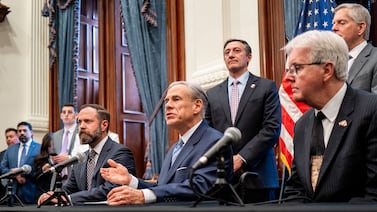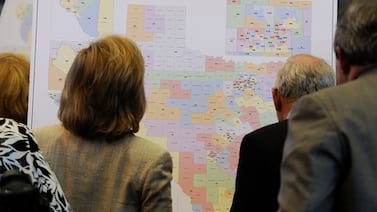Votebeat is a nonprofit news organization reporting on voting access and election administration across the U.S. Sign up for our free newsletters here.
During the 2021 legislative session, Texas lawmakers responding to baseless claims of widespread voter fraud after the 2020 presidential election backed a sweeping law that reworked voting by mail and put election workers under new scrutiny. House Democrats, in a desperate and unsuccessful attempt to deprive the chamber of a quorum and block the law’s passage, fled the state.
This year, there’s been less drama. But some of the election legislation most likely to emerge from this session also has the potential to reshape processes around the state, and many bills stem from Election Day stumbles in Harris County, the state’s largest.
State Sen. Paul Bettencourt, a Republican who represents part of Harris County, filed about a dozen election-related bills, and “the genesis” of all of them, he said, were Harris County’s Election Day problems.
“This is about a catastrophic lack of performance in Harris County,” Bettencourt said during an hourslong Senate committee hearing last month. “It’s too big to ignore. The state can’t afford this type of problem in Harris County, and neither can the residents.”
Last month, Elections Administrator Clifford Tatum told Votebeat his office was prepared to answer lawmakers’ questions if requested, but Harris County officials have yet to testify in front of either the Senate or the House this legislative session.
Tatum also said, however, that the bills before the state Legislature do not provide solutions to the problems Harris or other counties have experienced. “What resolves those issues is providing resources that allow us to address those issues,” Tatum said.
During last November’s midterm election, hundreds of Harris County voters waited for hours, contending with delayed openings and malfunctioning voting machines across multiple polling locations. Other polling sites ran out of ballot paper.
A recent investigation by the Houston Chronicle found that the county’s Election Day problems were not as widespread as Bettencourt and even Gov. Greg Abbott have said. But the county has yet to address whether the problems that day prevented anyone from voting, which can be hard to gauge because Harris County voters can cast ballots at any site countywide.
The problems prompted the local Republican Party and several candidates to sue the county and the elections administrator, seeking a new election. Trial dates have been set for June.
With about a month left in this legislative session, bills giving state officials more authority over local elections appear poised to win lawmakers’ support. As Votebeat has reported, bills such as these could have implications for the hiring and retention of elections officials and could change the working dynamic between the counties and the secretary of state’s office. Some voting rights groups such as the League of Women Voters say this type of legislation is also concerning because it “infringes on the rights of county governments” who are best positioned to address the needs of their voters.
People in Texas say they’re proponents of local control, said Daniel Griffith, senior director of policy at Secure Democracy USA, an election policy advocacy nonprofit organization, but “these bills certainly seem to be really contrary to those trends and those ideas around letting local voters decide who’s going to make the decision for them,” he said.
Key deadlines to pass legislation are next week, and Texas lawmakers must end the session by May 29. Most of the outstanding bills still must be approved by a second chamber. Among the bills moving forward that would give the state more election oversight:
- Senate Bill 1933 would give the secretary of state the authority to intervene and suspend and replace a county election administrator if there’s “good cause to believe” the county has experienced a continuous pattern of election administrative problems. The bill has been approved by the Senate and is expected to be heard in the House Elections Committee this week.
- Senate Bill 1039 would require local election officials to answer questions related to election irregularities and provide explanations when information is requested by election judges, local and state party chairs, or candidates. If the county fails to provide a “satisfactory” explanation, the secretary of state’s office could step in, assess and, if necessary, audit the county. The bill has been approved by the Senate and is scheduled for a hearing in the House Elections Committee this week.
- Senate Bill 1750 would eliminate the elections administrator position only in Harris County and would return all election duties back to the county tax assessor-collector and county clerk. The bill was approved by the Senate and on Monday passed out of the House Elections Committee.
- Senate Bill 220 would allow the secretary of state to appoint election marshals to enforce the election code and address violations. This bill was approved by the Senate and has not been scheduled for a hearing in the House yet, which suggests it could stall.
These are the other election administration and voting bills gaining momentum this session to watch closely:
- Senate Bill 2 would raise the penalty for illegal voting to a felony and was approved by the Senate. The House passed its own version of the legislation last week, with key differences from the Senate bill that would have to be reconciled.
- Senate Bill 1070 would allow Texas to withdraw from the Electronic Registration Information Center, a multistate program for checking and cleaning voter rolls, if the state can find a replacement. This bill has already been approved by committees in both chambers and is pending discussion on the House floor.
- Senate Bill 990 would ban the use of countywide polling locations on Election Day. The bill was approved by the Senate and was referred to the House Elections Committee. A hearing has not been scheduled.*
There are also bills that aim to expand voting access and address obstacles in election administration. Here’s where they stand heading into the last month of the session:
- House Bill 4780 would improve mail-ballot verification by moving voters’ verification information, such as partial Social Security numbers and drivers license numbers, from the carrier envelope to an easier-to-read sheet inside the envelope. The bill has been approved by the House Elections Committee and set pending discussion on the House floor.
- House Bill 3159 would allow for accessible absentee ballots for voters with disabilities. The accessible absentee ballots would be electronic in order to help voters who need assistive technology to read or mark their ballots. The bill has been approved by the House Elections Committee and set pending discussion on the House floor.
- House Bill 1208 would allow a child under the age of 14 to assist a parent in reading and marking a ballot. The bill was approved by the House Elections Committee and set for approval on the House floor.
- Senate Bill 477 would allow voters with disabilities to skip the lines at polling places, would facilitate curbside voting and would partially digitize the process of applying for a mail ballot. The bill was approved by the Senate and set for a House Elections Committee hearing this week.
- House Bill 4697 would improve the process of the partial hand count the state requires as part of the counties’ post-election audits. The bill was approved by the House Elections Committee and is pending discussion on the House floor.
- Senate Bill 1661 would fix a provision of a law that requires counties to replace their election equipment by 2026 with technology that does not exist, at a cost of more than $100 million to taxpayers. The bill was approved by the Senate last month and was heard by the House Elections Committee last week.
Correction, May 2: This article originally stated that Senate Bill 990 was scheduled for a hearing this week. It does not yet have a hearing date.
Natalia Contreras is a reporter for Votebeat covering election administration and voting access in partnership with the Texas Tribune. Contact Natalia at ncontreras@votebeat.org.






